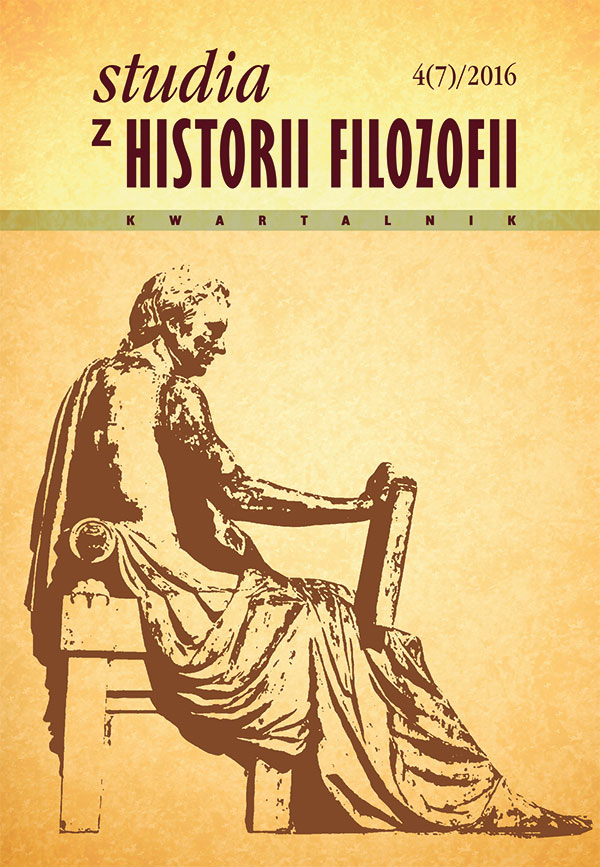David Hume: That Economics may be reduced to a Science
DOI:
https://doi.org/10.12775/szhf.2016.063Keywords
David Hume, science, economics, ScotlandAbstract
The title of this article refers to one of the best-known essays written by David Hume, That Politics may be reduced to a Science. Hume assumed that politics was a science because it admitted of some general truths, which could not be varied by human beings. He adopted a similar stance, albeit indirectly, in the case of economics, discovering several general truths concerning the origins of wealth, money and international trade. At times, however, he was far from being consistent and this undermined these truths. Consequently, it can be argued that, from his perspective, economics was a science on a theoretical level, but it lost this character at a more practical level. Similar doubts can be raised when it comes to Hume’s role in the history of economic thought. In some respects he was an original thinker, but several of his key concepts resembled to some extent ideas that had been put forward by ‘mercantilists’, especially those ‘mercantilists’ who were active in his native Scotland in the first decade of the 18th century.
References
Arkin M., The Economic Writings of David Hume – A Reassessment, [w:] Essays in Economic Thought. Aristotle to Marshall, eds. J. J. Spengler, W. R. Allen, Rand McNally, Chicago 1960.
Black W., Essay upon Industry and Trade, Shewing The Necessity of the One, The Conveniency
and Usefulness of the other, and the Advantages of Both, Edinburgh 1706.
Black W., Some Considerations in relation to Trade, Humbly Offered to His Grace Her Majesty’s high Commissioner and the Estates of Parliament, b.m.w. 1706.
Black W., Some overtures and conditions in Relation to Trade and Cares, Humbly Offered to the Parliament. By a Well-wisher to his Country, b.m.w. 1706.
Clerk J., The Circumstances of Scotland Consider’d, With Respect to the present Scarcity of Money: Together with some proposals For supplying the Defect thereof, And rectifying the Ballance of Trade, Edinburgh 1705.
David Hume: Writings on Economics, ed. E. Rotwein, T. Nelson and Sons, Edinburgh 1955.
Defoe D., An Argument Shewing, that a Standing Army, with Consent of Parliament, is not Inconsistent with a Free Government, [w:] Selected Writings of Daniel Defoe, ed. J. T. Boulton, Cambridge Univeristy Press, Cambridge 1975.
Hodges J., The Rights and Interests Of the Two British Monarchies. With a Special Respect to An United or Separate State. Treatise III. Containing Farther Inquiries into the Best Means for procuring a Happy Union betwixt the Two Kingdoms; with a Special Regard to the Argument, That the Making Both Nations ONE PEOPLE, must also Make them of ONE INTEREST, London 1706.
Hont I., Free trade and economic limits to national politics: neo-Machiavellian political economy reconsidered, [w:] The economic limits to modern politics, ed. J. Dunn, Cambridge University Press, Cambridge 1990.
Hume D., Badania dotyczące rozumu ludzkiego wraz z apendyksami, przeł. D. Misztal i T. Sieczkowski, Wydawnictwo Zielona Sowa, Kraków 2004.
Hume D., Eseje z dziedziny moralności, polityki i literatury, przeł. Ł. Pawłowski, Wydawnictwo Uniwersytetu Warszawskiego, Warszawa 2013.
Hume D., O handlu, przeł. S. Zabieglik, „Nowa Krytyka” t. 20–21 (2007).
Hume D., O kredycie publicznym, przeł. A. Grzeliński i A. Markwart, „Studia z Historii Filozofii” 1(7)/2016.
Hume D., O pieniądzu, przeł. A. Grzeliński, „Studia z Historii Filozofii” 1(5)/2014.
Hume D., O podatkach, przeł. S. Zabieglik, „Pieniądze i Więź”, rok II, nr 2 (7) wiosna 2000.
Hume D., O procencie, przeł. A. Grzeliński i K. Wawrzonkowski, „Studia z Historii Filozofii” 4(5)/2014.
Hume D., O równowadze handlu, przeł. D. Kosiewicz-Wawrzonkowska, „Studia z Historii Filozofii” 1(6)/2015.
Hume D., O studiowaniu historii, przeł. P. Michalski, „Nowa Krytyka”, t. 20–21 (2007).
Hume D., O tym, czy ustrój brytyjski skłania się raczej ku monarchii absolutnej, czy republice, przeł. M. Filipczuk, „Principia” t. XXXII–XXXIII (2002).
Hume D., O zawiści w handlu, przeł. K. Wawrzonkowski, „Studia z Historii Filozofii” 4(6)/2015.
Hume D., Of the Populousness of Ancient Nations, [w:] Essays moral, political and literary, ed. E. F. Miller, Liberty Fund, Indianapolis 1987.
Hume D., Traktat o naturze ludzkiej, przeł. C. Znamierowski, Fundacja Aletheia, Warszawa 2005.
Kopczyńska K., Zabieglik S., Psychologia ekonomiczna Davida Hume’a, „Nowa Krytyka” 20–21 (2007).
Lyon R., Notes on Hume’s Philosophy of Political Economy, „Journal of the History of Ideas”, vol. 31, no. 3 July/September 1970.
Mackenzie G., Parainesis Pacifica; or a perswasive to the Union of Britain. By a Person of Quality, London 1702.
Markwart A., Filozofia XVII wieku jako inspiracja dla prekursorów klasycznej myśli ekonomicznej, „Studia z Historii Filozofii” 2(4)/2013.
Mercantilism, ed. L. Magnusson, t. 1, Routledge, London–New York 1995.
Paterson W., The Occasion of Scotland’s Decay in Trade, with a proper expedient For Recovery thereof, And The Increase of our Wealth, b.m.w. 1705.
Philopatris T. W., An Essay Concerning Inland ad Foreign, Publick and Private Trade; together with some Overtures, shewing how a Company or National Trade, may be continued in Scotland, with the Advantages which will result therefrom, b.m. i d. w. Publications of the Scottish History Society, New Series, vol. III, Seafield Correspondence from 1685 to 1708, ed. J. Grant, Scottish History Society, Edinburgh 1912.
Seton W., Some Thoughts, on Ways and Means For making This Nation a gainer in Foreign Commerce; And for Supplying Its present Scarcity of Money, Edinburgh 1705.
Seton W., The Interest of Scotland in three Essays, b.m.w. 1700.
Skinner A. S., David Hume: Principles of political economy, [w:] The Cambridge Companion to Hume, ed. D. F. Norton, Cambridge University Press, Cambridge 1993.
Smith A., Badania nad naturą i przyczynami bogactwa narodów, t. 2, Państwowe Wydawnictwo Naukowe, Warszawa 2007.
Zabieglik S., Eseje ekonomiczne Davida Hume’a, „Nowa Krytyka” 20–21 (2007).
Downloads
Published
How to Cite
Issue
Section
Stats
Number of views and downloads: 553
Number of citations: 0



